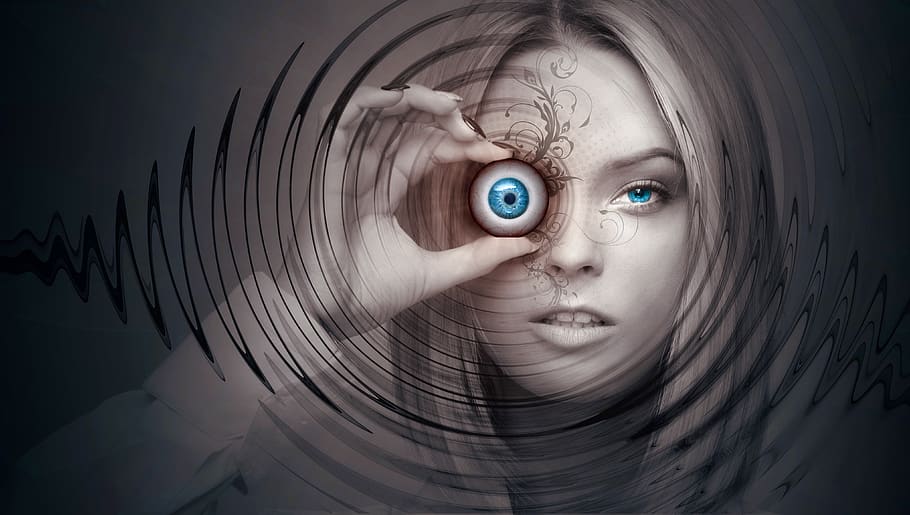We insulate ourselves from the world by labelling everything, by judging everything and then not looking any further than our judgments. This is the key to everything – to say what things are and then not look beyond whatever it is that we have said. This is how we create the Positive World for ourselves. What we’re talking about here isn’t really ‘creating’ however – that is using language very loosely. There is no creativity involved here whatsoever, only ‘the arbitrary imposition of a limitation’.
The Positive World – the world in which everything is either known or knowable – doesn’t come about as a result of a creative act, therefore; it comes about as a result of not questioning. The only reason that we can have this cosy little world (in which everything can be safely known) is because we make a point of not examining what we have previously said to be true. The attitude of not examining or not questioning the boundaries that we ourselves have put in place is the crucial ingredient for positive or unconscious living, therefore. We won’t see it this way ourselves of course, but this is what it’s all about.
‘Positive living’ sounds good to us, it sounds like something we would all like to do, but what this comes down to is living defensively – we are defending ourselves against the property of the natural world that we aren’t at all happy about, which is the property of openness, the property that it has of not agreeing with our ideas about it. Openness never agrees with any of our positive statements, after all – if it did then it wouldn’t be openness, it would be mere ‘confirmation’. If we were to ask why we should want to insulate ourselves from the world by automatically labelling or judging everything then this is the very simple answer – we insulate ourselves because we wish to protect ourselves from ontological depth, or ‘depth of being’. Positive living is superficial living, in other words – it is living that never goes too deep (and which therefore is not actually ‘living’ at all).
On the face of it this is very odd; none of us want to see ourselves as being superficial, or as living superficial lives – that doesn’t sound too good, at all! No one likes to think of themselves as being someone who purposefully goes around never questioning anything for fear of what they might find and who is for this reason naively accepting everything at face value. We all know that that is a very dumb way to be; being shallow and infinitely credulous isn’t something anyone would deliberately aim at (or so we would think). It would be hard for us to respect ourselves if we knew that this was our game; it isn’t exactly inspirational, it isn’t exactly ‘something to feel good about’. We wouldn’t want to see this about ourselves, but that doesn’t necessarily mean that it isn’t the case, all the same.
This fundamentally defensive and incurious attitude of ours comes about as a result of our unacknowledged fear of ontological depth and our need to protect ourselves from having any awareness that there even is such a thing. The existence of this fear, along with the unquestioned need to act on it constitutes a basic psychological truth that applies to us all, albeit one that we never hear about, or read about in any textbook on psychology. Notwithstanding this rather glaring omission, it remains the case that the need to protect ourselves against the perils of ontological depth is at the very core of our everyday, routine based run-of-the-mill type existence. This ‘rule’ underscores everything we do, everything we perceive, everything we think. If we say that this isn’t the case, and that we’re not living under this absolute constraint, then we’re simply deceiving ourselves. Self-deception is the name of the game, after all, when we’re defending ourselves against openness.
It goes without saying that if we are operating on such a basis – the basis that we don’t ever want to go too deeply into stuff – then we have to hide this motivation from ourselves and disguise it as something else, something more palatable. Were we to have awareness of the basic defensive nature of our activities (or of our attitude to life) then our attention would straightaway be drawn to the question as to what exactly we are defending ourselves against, and this is precisely where we don’t want our attention to go. Red herrings are needed, and plenty of them!
This situation requires us to set up an overt (or ‘explicitly stated’) system of meaning that will allow us to distract ourselves from ‘what’s really going on’ which is what we might call the covert level of meaning (the covert or hidden level of meaning being the ‘secret agenda’ that we can never be allowed to know about. All we need to do then is to make very sure that we restrict ourselves to the overt level of things, to the explicit or stated reality which is the Realm of Extrinsic Meaning. ‘Living within the limitations that we have set for ourselves without admitting that we have done so’ becomes the order of the day. Non-stop distraction becomes the order of the day…
Again, living within limitations which we ourselves have arbitrarily put in place for ourselves is not going to facilitate us in feeling very good about ourselves, but we avoid this awareness by telling ourselves that these limits the rules that him in our existence are not of our own making, but – on the contrary – have been ordained either by fate or by some higher power. We either say that this is ‘just the way things are’ and that therefore we just have to ‘get on with it’ or we might (quaintly) say that this is the way is the way God wants things to be (which puts the stop to our questioning pretty sharpish since no one in their right mind wants to go against the Almighty). The end result is exactly the same in both cases – we sneakily convert the ‘opus proprium’ into the ‘opus alienum’.
James Carse refers to this sneaky manoeuvre as ‘self-veiling’ – essentially, we’re giving our freedom away and then obscuring the fact that we have done so. We claim – in an implicit rather than explicit way – that the freedom we gave away never actually existed in the first place. We laugh at those who say it did or does; we treat them as if they are soft in the head. It is – we say – a sign of strength, a sign of character, a sign of maturity, to ‘face up to facts’ – no matter how dull or banal or just plain stupid those so-called ‘facts’ are. We are therefore ‘making a virtue out of a vice’.
The question as to why we are so fundamentally averse to ontological depth remains, however. Having actual honest-to-goodness depth (rather than just ‘putting on an act’) sounds like a great thing – no one wants to be a cardboard cut-out of a person, no one wants to be like some kind of plastic dummy. We want our lives to be meaningful not shallow and we know on some level that the only place meaning can come from is depth. Just as Plato says that an unexamined life is not worth living, so too we can say that a life without depth is not life at all. It is the superficial appearance of life – a form of empty mimicry, and nothing more.
There are lots of things we could say about depth – we could say that it comes from actually looking at the world rather than simply projecting our habitual ideas and beliefs on it, we could say that it comes from actually examining ourselves, rather than ‘making stuff up’, we could say that it’s not about ‘selecting an identity that appeals to us’, that it hasn’t got anything to do with any choices we might make (however dis-empowering that might sound to our modern ears). Depth isn’t something we can deliberately set out to achieve for ourselves, in other words; it happens despite our efforts not because of them. This isn’t a goal – we can’t make ‘becoming less shallow’ into a New Year’s resolution…
Even though it is true that meaning comes from the depths (and is not to be found ‘on the surface’, which is where we usually look) it is also true that’s where we to become aware of those depths then this is highly uncomfortable for us. When we see that the world is not what we say it is, not what we always think it is, not what we habitually describe or define it as being, then this is uniquely disturbing kind of a thing. It shakes us to the core. We have – after all – spent our entire lives adapting to the cosy consensus view of the world; we have become – over time – very comfortable with that unchallenging picture and – as experience always shows – the more comfortable we are existing solely within our everyday routines, the more uncomfortable it is going to be for us to be unceremoniously evicted from them…
Credit – Google images






